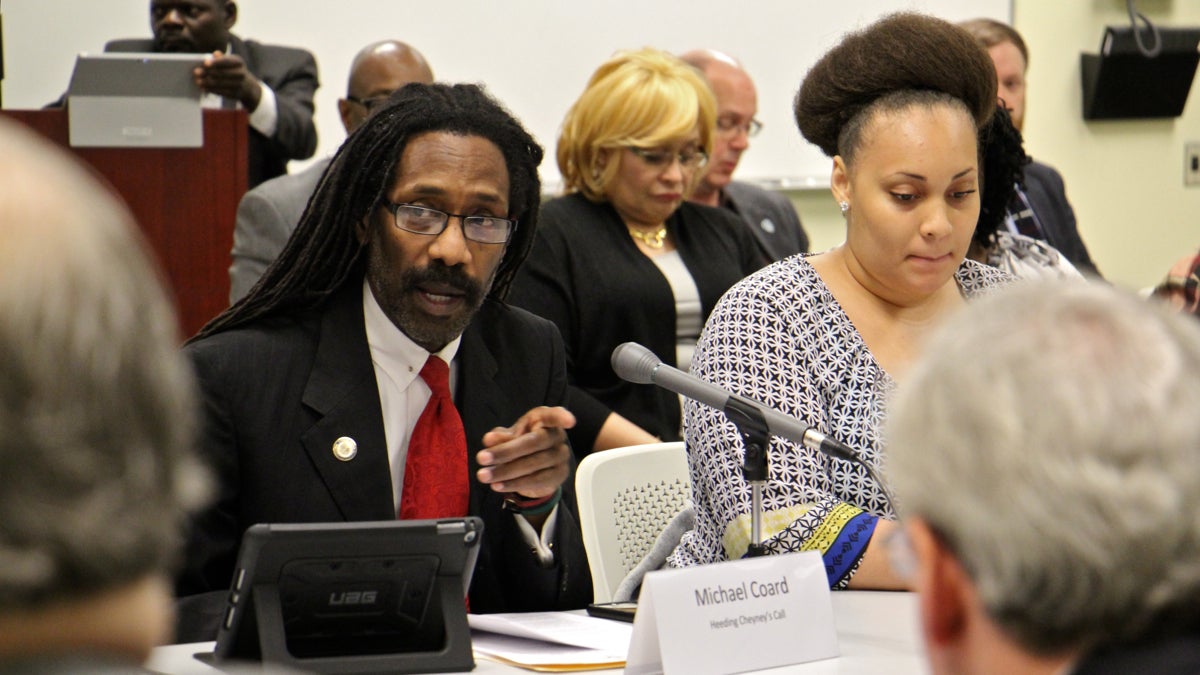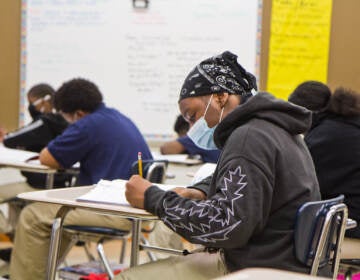Lawmakers hear Cheyney University students and alumni plead for better funding

Cheyney University graduate and Temple University adjunct professor Michael Coard testifies at a public hearing on how to fund the struggling historically black university. (Emma Lee/WHYY)
The financially troubled Cheyney University is drawing special attention from Pennsylvania lawmakers as they draft budget priorities.
The House Democratic Policy Committee hosted a hearing in Center City to hear from students and alumni worried about the historically black college.
One of the 14 universities that make up the Pennsylvania State System of Higher Education, Cheyney has faced myriad challenges recently, ranging from the mismanagement of millions of dollars to dwindling enrollment.
Rising junior Nyrie Watson mentioned the outdated technology students use to the fifteen member panel.
“Cheyney students deserve to be as prepared and competitive as other peers and colleagues once they leave the place they entrusted to train them,” the Wilmington, Delaware, native said.
Shayahna Nicole Smith, a music major at Cheyney, talked about the problems she’s seen.
“There’s no way pipes should be breaking, leaving students without water to take showers for a week,” the rising junior said. “There’s no way the smell of mold should be in the Marian Anderson Auditorium when it has been remodeled. Why doesn’t our football team have new equipment and new facility to use? Why are the music majors suffering?”
The 23-year-old from Coatesville urged the committee members to boost funding for the university.
“We hear you loud and clear on how you feel about Cheyney. Just visit our campus. You will see the lack and the needs that so easily can be fixed,” she said.
State Rep. Jordan Harris echoed the sentiment, when discussing Cheyney.
“You provide [students] with dormitories that look better than the neighborhoods that they come from. Cause I’ve been there, and some of those dormitories look like some of the impoverished neighborhoods that the students are coming from.”
Harris says he’s fed up on behalf of students who defied the odds just to get to college.
“Then they go to Cheyney hoping, dreaming — and through no fault of their own — many of them still aren’t getting the quality education that they deserve,” he said. “You have professors who are working tirelessly, but they don’t have the tools, don’t have the finances. And quite honestly, it’s a travesty.”
Two dozen people attended the hearing that was sponsored by Philadelphia representatives Stephen Kinsey, Jim Roebuck and Harris, all Democrats.
Michael Coard testified as an alumnus and a founder of Heeding Cheyney’s Call, a broad-based coalition of Cheyney supporters.
“Cheyney University, an all-time great university, has an all-time low student enrollment and all-time high budget deficit,” he said.
The nation’s oldest institution of higher learning for African-Americans has faced a 50 percent decline in enrollment from five years ago and a 30 percent drop from last year.
Heeding Cheyney’s Call, which is not affiliated with the university, filed a civil rights lawsuit two years ago against then-Gov. Tom Corbett, PASSHE’s Board of Governors and then-U.S. Secretary of Education Arne Duncan for alleged discriminatory funding.
The case was dismissed this January.
Wearing a blue-and-white tie in honor of Cheyney’s colors, Roebuck noted the funding issues are not new.
“One of the first issues I remember dealing with when I came to the legislature 30 years ago was funding for Cheyney University,” the Democratic chair of the house education committee said. “These are not new problems. They’re problems we talk about a lot and somehow don’t resolve.”
The panel’s main goal was to hear directly from students and alumni how the university’s current funding has impacted them, according to State Rep. Kinsey, but not everyone may have known that.
At the end of the nearly three-hour hearing, Harris was disappointed neither Cheyney nor PASSHE administrators attended.
“I don’t understand why we’re having this policy hearing when there’s no one from the administration of Cheyney here and there’s no one from PASSHE here,” he said. “Quite honestly, I think it’s disrespectful to this panel for us to even have this kind of conversation without those parties being here.”
A PASSHE representative was there but was asked not to testify by Kinsey. He also said Cheyney administrators were not invited.
“In the political arena, the administration works for the Chancellor, so I’m not sure what they could offer different [from PASSHE],” Kinsey said. “It’s important to hear without interruption from the folks who are impacted.”
PASSHE officials say Cheyney receives the highest per-student funding of the 14 state-owned schools.
Cheyney interim president Frank Pogue — former president of PASSHE’s Edinboro University and of the historically black college Grambling State University — has a different take.
“We never had enough to do what we needed to do in the first place, and you can see it right now,” he said last September. “Just visit the residence halls and compare it with what many of the other 13 campuses have. Look at almost any aspect of the university itself. It’s a combination of neglect that we have to admit has occurred.”
Legislators have previously met with PASSHE and Cheyney, and the committee is planning another session to hear from state education officials and Cheyney administrators.
WHYY is your source for fact-based, in-depth journalism and information. As a nonprofit organization, we rely on financial support from readers like you. Please give today.




